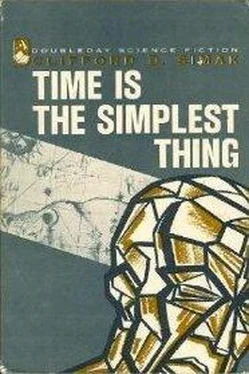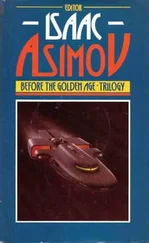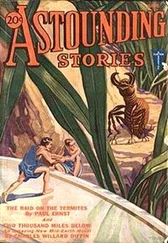“I could have left in the car.”
The sheriff shook his head. “Son, I know these people. I was raised with them. I am one of them. I know how far I can go with them and when I’ve got to stop. I could get the lady off, but not the both of you. You ever see a mob in action?”
Blaine shook his head.
“It ain’t a pretty sight.”
“How about this Sara? She’s a parry, too.”
“Well, I tell you, friend. Sara has good blood behind her. Fell on evil times, but her family’s been here for more than a hundred years. The town just tolerates her.”
“And she’s handy as a spotter.”
The sheriff shook his head and chuckled. “There ain’t much,” he said, with local pride, “that filters past our Sara. She has a busy time of it, watching all the strangers that come into town.”
“You catch a lot of parries that way?”
“Tolerable,” said the sheriff. “Every now and then. A tolerable number, I would say.”
He motioned at the desk. “Just dump your pockets there. The law says I got to do it. I’ll fix up a receipt for you.”
Blaine began digging in his pockets. Billfold, card case, handkerchief, key ring, matches and, finally, the gun.
He lifted it out rather gingerly and laid it with the other stuff.
The sheriff eyed it. “You had that all the time?”
Blaine nodded.
“And you never reached for it?”
“I was too scared to reach for it.”
“You got a permit for it?”
“I don’t even own it.”
The sheriff whistled softly through his teeth.
He picked up the gun and broke it. There was the coppery shine of cartridge cases.
The sheriff opened a desk drawer and tossed it in.
“Now,” he said, as if relieved, “I’ve got something legal I can hold you on.”
He picked up the book of matches and handed them to Blaine.
“You’ll want these for smoking.”
Blaine put them in his pocket.
“I could get you cigarettes,” the sheriff said.
“No need,” Blaine told him. “I carry them sometimes, but I don’t do much smoking. Usually I wear them out carrying them before I get around to smoking.”
The sheriff lifted a ring of keys off a nail.
“Come along,” he said.
Blaine followed him into a corridor that fronted on a row of cells.
The sheriff unlocked the nearest one, across the corridor from the door.
“You’ve got it all alone,” he said. “Ran the last one out last night. Boy who came across the border and got himself tanked up. Figured he was as good as white folks.”
Blaine walked into the cell. The sheriff banged and locked the door.
“Anything you want,” he said, with a fine show of hospitality, “just yell out and say so. I’ll get it for you.”
It had gone by many names.
Once it had been known as extrasensory perception. And then there had been a time when it had been psionics, psi for short. But first of all it had been magic.
The medicine man, with the oxides that he used for paint, with his knucklebones to rattle in the skull, with his bag of nauseous content, may have practiced it in a clumsy sort of way before the first word had been written — grasping at a principle he did not understand, more than likely not even knowing that he did not understand, not realizing there was anything he ought to understand. And the knowledge was passed on, from hand to inept hand. The witch doctor of the Congo used it, the priests of Egypt knew it, the wise men of Tibet were acquainted with it. And in all these cases it was not wisely used and it was not understood and it got mixed up with a lot of mumbo jumbo and in the days of reason it became discredited and there was scarcely anyone who believed in it.
Out of the days of reason rose a method and a science, and there was no place for magic in the world that science built — for there was no method in it and there was no system in it and it could not be reduced to a formula or equation. So it was suspect and it was outside the pale and it was all stupid foolishness. No man in his right mind would once consider it.
But they called it PK now for paranormal kinetics, which was too long to say. And the ones who had it they called parries and shut them up in jails and did even worse than that.
It was a queer business, once one thought of it — for despite the strange gulf which lay between PK and science, it had taken the orderly mind which science had drummed into the human race to make PK finally work.
And, strange as it might seem, Blaine told himself, it had been necessary that science should come first. For science had to be developed before Man could understand the forces which had freed his mind from the shackles in which they had been bound, before mental energy could be tapped and put to work by those who quite unsuspectingly had always carried with them that power and energy. For even in the study of PK there had been a need for method, and science had been the training ground in which method had developed.
There were those who said that in some distant past two roads had forked for mankind, one of them marked “Magic” and the other “Science,” and that Man had taken the “Science” road and let the “Magic” go. Many of these people then went on to say that Man had made a great mistake in the choosing of the roads. See how far we’d have gone, they said, if we had taken “Magic” at the first beginning.
But they were wrong, Blaine said, talking to himself, for there had never been two roads; there’d only been the one. For Man had had to master science before he could master magic.
Although science had almost defeated magic, had almost driven it into limbo with laughter and with scorn.
And would have driven it had there not been stubborn men who had refused to give up the dream of stars. Men who had been willing to do anything at all, to brave the laughter of the world, to accept derision, if they only could lay hands upon the stars.
He wondered how it must have been in those days when Fishhook had been no more than a feeble hope, a glimmer of the mind, an article of faith. For the little band of hopeful, stubborn men had stood entirely by themselves. When they had asked for help, there had been no help, but only scornful chuckling against such errant foolery.
The press had made a field day of it when they had appeared in Washington to ask financial aid. There had, quite naturally, been no such aid forthcoming, for the government would have naught to do with such a wildcat scheme. If science in all its might and glory had failed to reach the stars, how could there be hope that such as these might do it? So the men had worked alone, except for such pittances as they might be given here and there — a small grant from India, another from the Philippines and a little from Columbia — plus dribbles that came in from metaphysical societies and a few sympathetic donors.
Then finally a country with a heart — Mexico — had invited them to come, had provided money, had set up a study center and a laboratory, had lent encouragementrather than guffaws of laughter.
And almost from that day, Fishhook had become reality, had developed into an institution which did credit not to itself alone, but to the country which had opened up its heart.
And I am a part of it, thought Blaine, sitting in his cell; a part of this virtually secret society, although secret through no fault of its own. Made secret, rather, by the envy and intolerance and the surging superstition of the entire world. Even though I am running from it, even though it be hunting me, I am still a part of it.
He got up from the tiny bunk with its dirty blanket and stood at the window, staring out. He could see the sunbaked street and the scraggly trees staggered on the boulevard and across the street the sad, defeated business houses with a few dilapidated cars parked against the curb, some of them so ancient they were equipped with wheels which in turn were driven by internal combustion engines. Men sat on the steps that led up to the store fronts, chewing tobacco and spitting out onto the sidewalks, creating little pools of sticky amber liquid which looked like old bloodstains. They sat there languidly and chewed and occasionally talked among themselves, not looking at the courthouse, looking nowhere in particulars but being very nonchalant about their deadly loafing.
Читать дальше








